
Ethik in der Medizin
Scope & Guideline
Fostering Interdisciplinary Dialogue on Health Ethics
Introduction
Aims and Scopes
- Clinical Ethics:
The journal emphasizes the ethical considerations inherent in clinical decision-making, particularly in vulnerable populations such as the elderly, patients with disabilities, and those facing end-of-life decisions. - Healthcare Policy and Ethics:
There is a strong focus on the ethical implications of healthcare policies, including issues like data use in research, the responsibilities of healthcare institutions, and the ethics surrounding emerging technologies. - Interdisciplinary Perspectives:
The journal welcomes contributions from various disciplines, including philosophy, theology, sociology, and law, fostering a rich dialogue that enhances understanding of medical ethics. - Patient Autonomy and Rights:
A consistent theme is the exploration of patient autonomy, informed consent, and the ethical obligations of healthcare professionals to respect patients' rights and preferences. - Emerging Technologies in Healthcare:
The journal engages with ethical questions surrounding the integration of new technologies in medicine, such as artificial intelligence, digital health applications, and their impact on patient care.
Trending and Emerging
- Ethics of Artificial Intelligence and Technology:
There is a noticeable increase in discussions surrounding the ethical implications of artificial intelligence and technology in healthcare, highlighting concerns about privacy, bias, and the impact on patient care. - Ethics in Palliative and End-of-Life Care:
Recent publications show a growing concern for ethical issues in palliative and end-of-life care, including assisted suicide, advance directives, and the rights of patients with terminal illnesses. - Mental Health Ethics:
The journal is increasingly addressing the ethical dimensions of mental health care, particularly related to autonomy, consent, and the treatment of vulnerable populations. - Global Health Ethics:
Emerging themes include the ethical responsibilities of healthcare systems in addressing global health disparities, especially in the context of pandemics and resource allocation. - Diversity and Inclusion in Healthcare Ethics:
There is an increasing focus on issues of diversity, including the ethical implications of care for marginalized communities, such as LGBTQ+ individuals and ethnic minorities, reflecting a broader societal shift towards inclusivity.
Declining or Waning
- Traditional Biomedical Ethics:
There seems to be a decline in the focus on traditional biomedical ethical frameworks, such as principlism, as newer, more nuanced approaches to ethics are being explored. - Generalized Healthcare Ethics:
The journal is moving away from broad discussions of healthcare ethics that do not engage with specific populations or contexts, favoring more targeted examinations of ethical issues. - Philosophical Theories in Isolation:
There is less emphasis on standalone philosophical theories without practical application to current medical dilemmas, as the journal leans towards applied ethics and real-world implications. - Historical Perspectives on Medical Ethics:
Papers focusing solely on historical analyses of medical ethics appear to be less frequent, suggesting a shift towards contemporary issues and future-oriented discussions. - Ethics Education in Isolation:
While ethics education remains important, there is a noticeable decline in publications focused exclusively on educational methodologies without direct ties to clinical practice or policy.
Similar Journals

New Bioethics-A Multidisciplinary Journal of Biotechnology and the Body
Illuminating the Social Implications of Biotechnological AdvancesNew Bioethics: A Multidisciplinary Journal of Biotechnology and the Body, published by Taylor & Francis Ltd, serves as a pivotal platform for scholarly discourse at the intersection of biotechnology, health policy, and bioethics. With an ISSN of 2050-2877 and E-ISSN 2050-2885, this journal has been contributing to the academic community since its establishment in 2012 and is set to continue through 2024. It holds notable rankings in prestigious fields, including Q4 in Genetics (clinical), Q3 in Health Policy, Q2 in Issues, Ethics and Legal Aspects, and Q3 in Reproductive Medicine as per 2023 quartile indicators. Although no open access model is available, the journal remains an essential resource for those interested in the ethical implications of biotechnological advancements. Its focus on the ethical, legal, and social dimensions of biotechnology is particularly relevant in today's rapidly evolving scientific landscape, making it invaluable for researchers, professionals, and students keen to explore the complexities surrounding the biotechnology and the human condition.
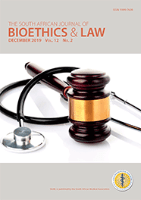
South African Journal of Bioethics and Law
Fostering insights into the ethical and legal challenges in health.South African Journal of Bioethics and Law, published by HEALTH & MEDICAL PUBLISHING GROUP, stands as a vital academic platform for discussions at the intersection of bioethics and legal studies. With an ISSN of 1999-7639, this journal has embraced an Open Access model since 2008, ensuring global accessibility for researchers, practitioners, and students alike. Based in South Africa, the journal operates from PRIVATE BAG X1, PINELANDS, CAPE TOWN 7430, and features diverse articles that span a multitude of pertinent topics across health professions, law, and public health. It proudly holds a Q3 ranking in Health Professions and Law sectors, affirming its status within the scholarly community. Notably, for the year 2023, it has achieved impressive placements in Scopus ranks, reinforcing its commitment to disseminating high-quality research and fostering dialogues that influence policy and practice in these critical domains. Researchers exploring the intricate ethical and legal dimensions of healthcare will find this journal an indispensable resource.
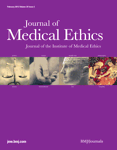
JOURNAL OF MEDICAL ETHICS
Pioneering Conversations on Medical MoralityJOURNAL OF MEDICAL ETHICS, published by the esteemed BMJ PUBLISHING GROUP, is a leading journal that has been pivotal in advancing the discourse on ethical issues in healthcare since its inception in 1975. This UK-based journal, with an ISSN of 0306-6800 and an E-ISSN of 1473-4257, is well-regarded for its high-quality, peer-reviewed articles that delve into the complex moral dimensions surrounding medical practices, health policies, and social sciences. With a commendable impact, JOURNAL OF MEDICAL ETHICS has achieved Q1 quartile rankings across multiple categories, including Arts and Humanities and Health Policy in 2023, reflecting its significant influence and relevance in the field—ranked #23 of 552 in Arts and Humanities (Miscellaneous) with a 95th percentile, and #26 in Health Policy with a 91st percentile. Researchers, professionals, and students alike can benefit from the journal's commitment to fostering a deeper understanding of ethical considerations vital to the medical community, although it currently does not offer open access options. The journal's comprehensive examination of issues, ethics, and legal aspects continues to make it an essential resource for those dedicated to shaping the ethical landscape of healthcare.

Cuadernos de Bioetica
Contributing to the Evolving Discourse in BioethicsCuadernos de Bioetica, published by the ASOC ESPANOLA BIOETICA & ETICA MEDICA, is a prominent academic journal dedicated to exploring significant philosophical, ethical, and legal dimensions within the field of bioethics. With an ISSN of 1132-1989 and an E-ISSN of 2386-3773, this journal serves as a vital platform for researchers, professionals, and students in medicine and related disciplines. Since its inception in 2008, it has consistently provided critical analyses and discussions reflecting the evolving landscape of healthcare ethics, contributing notably to the discourse surrounding ethical practices in medicine. Despite its current Q4 ranking in the miscellaneous medicine category, Cuadernos de Bioetica is committed to enhancing its impact and relevance, making it an essential resource for those seeking to navigate the complex ethical challenges in contemporary medical practice. The journal’s reach is underscored by its commitment to fostering open dialogue among diverse stakeholders in the field, encouraging a broad spectrum of contributions to advance knowledge in bioethics.
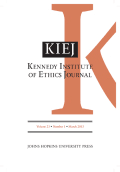
KENNEDY INSTITUTE OF ETHICS JOURNAL
Bridging Philosophy and Practice in Ethical Health DiscourseThe KENNEDY INSTITUTE OF ETHICS JOURNAL, published by the prestigious Johns Hopkins University Press, stands as a leading periodical in the realm of ethics, particularly emphasizing the intersection of health policy, social sciences, history, and philosophy of science. With an ISSN of 1054-6863 and an E-ISSN of 1086-3249, this journal has been a cornerstone of ethical discourse since its inception in 1991. Renowned for its rigorous peer-review process, the journal boasts impressive rankings, including Q1 in History and Philosophy of Science and Q2 in Health (Social Science) for 2023. Researchers, professionals, and students alike will find this journal invaluable for navigating complex ethical issues, providing a platform for innovative research and discourse. Although currently not offering Open Access, its contributions to the fields of ethics and legal aspects of health are profound, making it an essential resource for those engaged in these critical discussions.
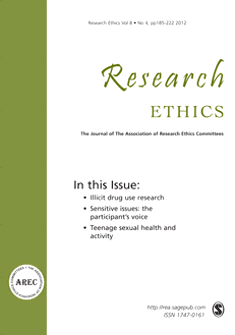
Research Ethics
Connecting Global Scholars in Ethical Research Practices.Research Ethics is a leading journal published by SAGE Publications Inc that fosters scholarly discourse at the intersection of ethical considerations and research practices. As an Open Access platform since 2018, it ensures that critical insights on ethical dilemmas faced by researchers are freely available to a global audience, significantly enhancing its reach and impact. With an impressive impact factor reflected in its Q1 and Q2 rankings in Philosophy and Education respectively for 2023, this journal occupies a vital space for researchers and professionals aiming to navigate the complex ethical landscape of contemporary research. As indicated by its strong Scopus rankings, falling into the 95th percentile in Arts and Humanities (Philosophy) and 77th percentile in Social Sciences (Education), Research Ethics is essential for anyone interested in contributing to or understanding ethical practices in research. The journal encompasses a broad scope, encouraging submissions that explore diverse aspects of research ethics, promoting high standards and integrity across disciplines. Join a community dedicated to advancing ethical research methodologies and contributing meaningfully to the dialogue that shapes the future of moral practices in academia.
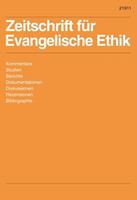
ZEITSCHRIFT FUR EVANGELISCHE ETHIK
Contributing to the Landscape of Religious EthicsZEITSCHRIFT FUR EVANGELISCHE ETHIK, published by WALTER DE GRUYTER GMBH, is a leading journal in the field of Religious Studies, noted for its critical examination of evangelical ethics and theological perspectives. With an ISSN of 0044-2674 and E-ISSN of 2197-912X, this journal serves as a pivotal platform for scholars seeking to explore contemporary issues through a rigorous ethical lens. Based in Germany, it engages readers with a rich tapestry of interdisciplinary insights, contributing significantly to ongoing discussions within the realm of religious ethics. The journal enjoys a commendable position in the Scopus rankings, placed in the Q3 quartile and ranking #476 out of 644 in its category, reflecting its dedication to quality scholarship. Spanning over two decades, with converged years from 2002 to 2024, it fosters valuable dialogues between researchers, professionals, and students alike. Although not Open Access, the journal's subscription options ensure accessibility to essential scholarly works that can impact both academic and practical applications in religious thought.
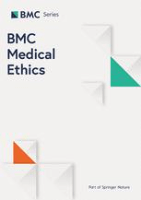
BMC Medical Ethics
Exploring the intersection of ethics and medicine.BMC Medical Ethics is a leading open-access journal dedicated to the critical exploration and dissemination of knowledge surrounding ethical issues in healthcare and medicine. Published by BMC, and headquartered in the United Kingdom, this journal has become a cornerstone in the field since its inception in 2000, with a remarkable focus on health policy, nursing ethics, and the complex legal aspects intertwining with healthcare practices. With an impressive Q1 ranking across multiple categories, including Health Policy and Health (Social Science), it ranks among the top journals globally—particularly notable with its Scopus rankings reflecting a strong 85th percentile in Nursing and an 81st percentile in Social Sciences. As an open-access publication, BMC Medical Ethics ensures that research findings are readily accessible, fostering a collaborative environment for researchers, practitioners, and students alike. The journal's commitment to ethical discourse not only advances academic inquiry but also shapes the practices and policies that govern healthcare delivery; thus, making it an invaluable resource for those engaged in the advancement of medical ethics.

Canadian Journal of Bioethics-Revue Canadienne de Bioethique
Championing open-access knowledge in bioethics.Canadian Journal of Bioethics-Revue Canadienne de Bioethique, published by the Universite de Montreal, is a premier open-access journal dedicated to advancing the multidisciplinary field of bioethics since 2012. Emphasizing the complexities of ethical practices in health policy, it serves as a vital resource for researchers, professionals, and students engaged in health and philosophy. With its E-ISSN 2561-4665, the journal's content is freely accessible, fostering knowledge dissemination and academic collaboration. Although categorized in Q4 among Health Policy and Health (social science) in 2023, it holds a respectable Q2 status in Philosophy, reflecting its strong theoretical contributions. Covering a wide scope from 2018 to 2024, the journal encourages robust discourse on pressing ethical issues facing contemporary healthcare systems. For those seeking to connect with the evolving narratives in bioethics, this journal is indispensable.
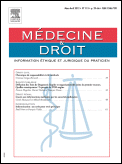
Medecine & Droit
Advancing Knowledge at the Crossroads of Medicine and LawMedecine & Droit, an esteemed journal published by ELSEVIER MASSON, CORP OFF, serves as a vital resource for the intersection of law and medicine. Since its inception in 1995, this journal has facilitated scholarly discourse by publishing innovative research, case studies, and reviews that explore the complexities of legal frameworks impacting medical practice and public health. Although currently classified in the fourth quartile within both the Law and Medicine (miscellaneous) categories for 2023, its contributions are important for legal professionals and healthcare providers seeking to navigate the evolving landscape of medical laws. With an ISSN of 1246-7391 and E-ISSN 1873-6475, it provides essential insights and stimulates interdisciplinary collaboration within academia. Authors and researchers are encouraged to contribute and engage with critical topics shaping the future of medicine and law through this essential publication.